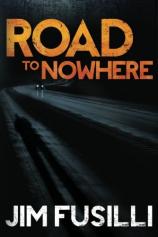Road to Nowhere
Review
Road to Nowhere
ROAD TO NOWHERE demonstrates yet another side of Jim Fusilli’s multi-faceted literary talent. While 2011’s NARROWS GATE was an unforgettable, sprawling coming-of-age crime novel about family and friendship, his latest is a dark novel of bad acts and worse luck, set very much in the here and now, featuring a memorable and sympathetic protagonist whose life is carried out under a series of grim clouds.
"[W]hile it is the type of work that asks --- demands --- to be read in one sitting, one is almost compelled to read it slowly, taking notes on Fusilli’s turns of phrase and underlining a sentence here and a paragraph there on nearly every page."
The book begins in the aftermath of two murders. The first is witnessed by Moira, a wife and mother; the second murder victim is Moira herself. Moira’s daughter “Pup” and her husband, who is given the name “Sam Jellico” when he is placed in the Witness Protection program, begin new lives, which ultimately unravel under the weight of their shared sorrow. Pup and Sam become estranged; Pup leaves and Sam creates his own apparent end. He begins wandering anonymously and aimlessly from city to city, lost in his own grief. He is in Chicago and riding the L Train when he witnesses a violent attack upon a woman occurring in a parking garage. When he goes to check on her, he finds that she is still breathing and that robbery apparently was not a motive.
Sam begins to intercede on her behalf, first calling an ambulance for her and then taking steps to hunt down her attacker and exact a tit-for-tat of sorts. These initial actions create a tug-of-war within him, one in which he is torn between the obligation that each and all of us have toward assisting our fellow human beings and the anonymity that he has cloaked around him, making him a part of the outside world while remaining detached. By involving himself in the aftermath of the brutal attack, Sam is drawn into a world where everything is a lie, every act is deceptive, and every step has the potential for violence. His tale does not end on the dark streets of Chicago; it leads him, seemingly improbably, from Chicago to California and to New York and beyond, where he is forced to confront the past and perhaps his future as well.
ROAD TO NOWHERE is not a large book by any means, but its length and sparse prose belie its breadth and width. A great deal of it --- particularly its Prologue and climax --- reads like a haunting fever dream. Fusilli’s style here is markedly different from what was utilized in his past work, so surprises naturally abound. While he has written about loss before, this novel explores that topic from an entirely new direction. And while it is the type of work that asks --- demands --- to be read in one sitting, one is almost compelled to read it slowly, taking notes on Fusilli’s turns of phrase and underlining a sentence here and a paragraph there on nearly every page. It is also one of those books that almost begs for a film version, one that will almost never top the original work as a mood piece.
Reviewed by Joe Hartlaub on November 16, 2012





